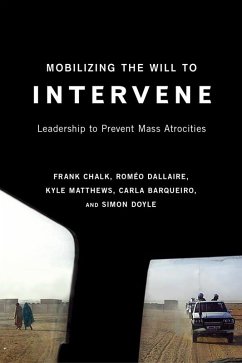Despite the handwringing and promises of "e;never again,"e; the grim recurrences of genocide and crimes against humanity around the world have made it emphatically clear that the international community has been largely ineffective in stopping mass atrocity crimes. Drawing on candid interviews with eighty key figures involved in American and Canadian responses to the Rwandan genocide of 1994 and the Kosovo crisis of 1999, Mobilizing the Will to Intervene explains why and provides a roadmap for change. Since appeals to the "e;moral law"e; carry little weight in the political calculations of modern states, the authors argue that civil society must persuade governments that the prevention of mass atrocities around the world is in every country's national interest. In a globalized world, violence, disease, and instability triggered by mass atrocities in one place affect the security, health, and prosperity of all other regions. No nation is an island. Impassioned, insightful, and determined, Mobilizing the Will to Intervene is a direct appeal to American and Canadian politicians, NGOs, journalists, and the public to participate effectively in the prevention of mass atrocities by pressuring their leaders to act. With simple, practical recommendations, this book shows how civil society can participate in preventing future mass atrocities and help repair a ruined system of international aid.
Dieser Download kann aus rechtlichen Gründen nur mit Rechnungsadresse in A, B, BG, CY, CZ, D, DK, EW, E, FIN, F, GR, HR, H, IRL, I, LT, L, LR, M, NL, PL, P, R, S, SLO, SK ausgeliefert werden.









